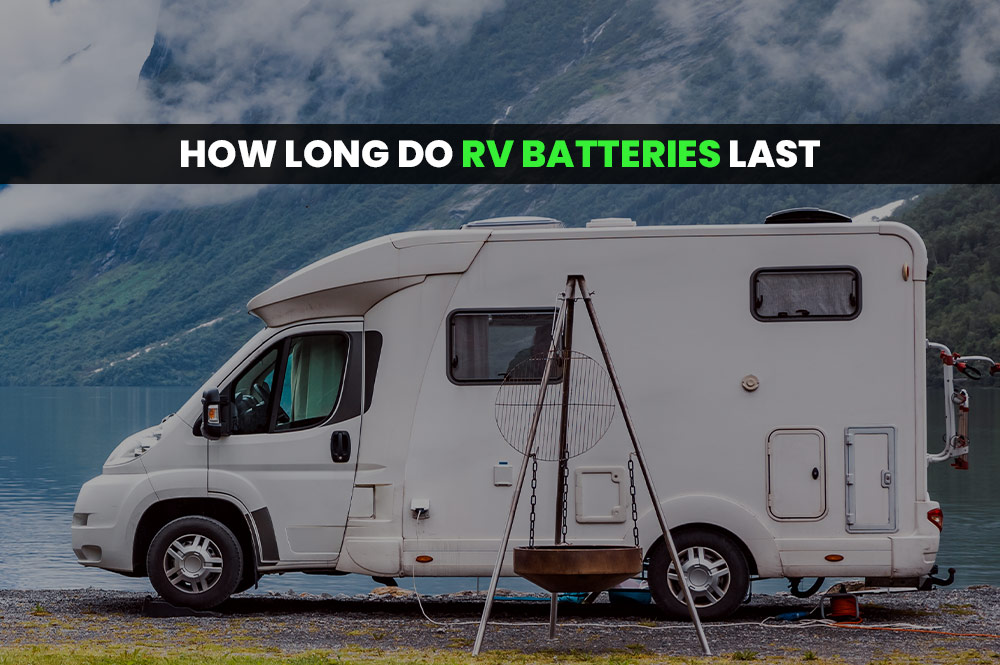How Long Do RV Batteries Last

Have you ever found yourself stranded with a dead RV battery in the middle of nowhere? Knowing the lifespan of different RV batteries can be the key to avoiding such situations. Let’s jump into the types of RV batteries, factors influencing their lifespan, and essential maintenance tips to ensure your RV adventures are worry-free.
Types of RV Batteries
RV batteries come in various types, each with its own lifespan. Here's a breakdown:
- AGM batteries: Lasting 500-800 cycles or 3-5 years.
- Gel batteries: Typically lasting 500-1000 cycles or 3-6 years.
- Flooded Lead Acid batteries: Lasting 500-1000 cycles with a lifespan of 3-6 years.
- Lithium batteries: Leading the pack with 2000-4000 cycles and a remarkable lifespan of 10-15 years.
What is Depth of Discharge (DoD)?
The Depth of Discharge (DoD) measures the percentage of a battery's total capacity that has been discharged and is ready to be recharged. Lithium-ion batteries discharge to a depth of 80-90%, outperforming lead-acid batteries, which discharge to only 45-50%. Keeping the DoD within recommended levels is crucial for maximizing battery life. For example, a 100Ah 12V lithium battery can last up to 3000 cycles with an 80% DoD, but only 2000 cycles with a 95% DoD.
Voltage (6V vs. 12V)
When it comes to 6V RV batteries, they can last at least 5 years with proper discharge and recharge practices. For 12V batteries, a lifespan of 5-6 years or more is achievable with good maintenance.
Usage Matters
The longevity of an RV battery on a single charge depends heavily on power usage. Running minimal appliances like a single lamp can extend battery life for several hours while powering a refrigerator, water pump, and TV may shorten it to two or three days. A standard 12V battery should cover your needs for a day or two while boondocking, but the actual duration depends on your electricity consumption.
Temperature's Impact
Extreme temperatures, both hot and cold, can affect battery life. It's crucial not to leave your RV battery idle for too long. Lithium iron phosphate batteries have a safe operating temperature range of -2065℃, while lead-acid batteries operate between -2055℃.
Also read: 10 Tips To Extend the RV Battery Life
Signs Your RV Needs a New Battery
To keep your RV in top condition, pay attention to these signs that suggest it's time to replace your battery:
- Age: Deep cycle or flooded batteries generally last around 5 years or more, while lithium batteries can go up to 8 years or more.
- Corrosion: Corroded battery terminals can hinder performance. If corrosion is visible, it's time for a replacement.
- Strange Sounds or Smells: Rumbling or sizzling sounds and unusual odors are indicators of a failing battery.
- Charge Discharge Efficiency: If the battery charges slowly, doesn't hold a charge, or drains quickly, it may need replacement.
12V Battery Maintenance Tips
Proper maintenance is key to extending the life of your 12V RV battery. Here are some tips:
- Monitor Depth of Discharge: Keep an eye on the DoD for your specific battery type to avoid over-discharging or overcharging.
- Avoid Discharged States: Don't leave your RV battery in a discharged state for an extended period.
- Keep it Clean: Regularly check for dirt or debris on the battery and clean it to maintain optimal voltage.
- Corrosion Check: If you see corrosion on the terminals, clean them with a brush, baking soda, and water.
- Storage: Store your RV battery in a cool, dry place during peak summer months.
- Trickle Charger: Use a trickle charger for slow and correct charging to the recommended capacity, avoiding overcharging.
Additional Tips for Maintaining Your RV Battery
1. Avoid Prolonged Discharge: Refrain from leaving your RV battery in a discharged state for an extended period, as this can adversely affect performance. Whenever possible, recharge the battery and resume regular use.
2. Keep the Battery Clean: Ensure no dirt accumulates on the battery, as this can interfere with voltage and reduce power. Regularly inspect and clean the battery, removing any dirt or debris build-up.
3. Address Corrosion Promptly: If you notice corrosion on the battery terminals, clean them with a brush, baking soda, and water. Corrosion compromises the battery's connection, leading to electrical issues and a reduced lifespan.
4. Storage Conditions: Store your RV battery in a cool, dry place during peak summer months to maintain optimal performance. For flooded batteries, check electrolyte levels regularly, ensuring water levels do not drop too low.
5. Use a Trickle Charger: Whenever possible, use a trickle charger to ensure the 12V RV battery is charged slowly and correctly to its recommended capacity. Never leave the charger connected to the battery when you're away.
Also read: How to Charge RV Batteries
Conclusion
Your RV battery is the lifeline of your adventures, and understanding its lifespan and how to care for it is paramount. Contact Batteries Store Calgary to choose the right type of RV Battery, get proper maintenance, and ensure your RV battery lasts longer. Through this, you can minimize the risk of being stranded in the middle of nowhere.
Read Next Blog: